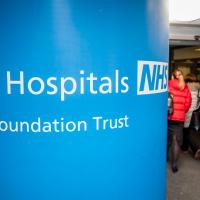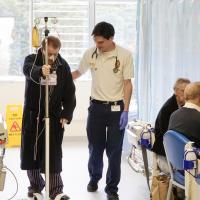Holly Brown - PhD
“Before I started my PhD, I worked as a research associate on a longitudinal project involving patients with age-related macular degeneration. The project was with my supervisor at the University of York in the department of Psychology, and in collaboration with the ophthalmology research team here at York Hospital. This was the first project I had worked on with the NHS but also the first one I had worked on independently, having only just finished my MSc in Cognitive Neuroscience.
It is safe to say everything was completely alien to me in terms of the process of getting ethics, and then what happens once the project is given the ‘green light’ and recruitment can begin. As it has been a while since anyone from the lab had done work like this, we were unsure what the procedures were, as systems frequently get updated, including the process for acquiring ethics for example.
Back in 2014/2015 as far as I could tell, I was the only person who was in this type of research role and so it was very difficult to get the project off the ground. I didn’t have any formal induction and didn’t know who to speak to about specific queries. As such, it took almost a year to get the project ethics approved and enter the recruitment phase. It was certainly a learning curve after that as well, identifying my specific training needs and project requirements, but also, due to changes in staff during that time, I felt as though people didn’t know who I was or what I was doing, so couldn’t help and I would end up back at square one.
Since then, things have changed massively. One of the positive consequences of having an unsteady start was that the PhD support network was subsequently set up by R&D. It was so essential to ensure the success of a project but also for myself and other researchers to feel confident in our ability to carry out the work. I really value the regular group meetings with fellow students and the R&D team, as it's nice to update the team on what it is we have been doing, but also makes me feel part of the research community at the hospital. Being able to showcase our work at the celebration day last year was great, as it shows despite the hurdles we had to overcome, we did manage to complete a project successfully. I am so grateful for the additional support, even though I am now entering my final year of the PhD and won’t be using the facilities for data collection any more. I am proud to say I helped with the development of the project and so it makes all the challenges faced seem worthwhile.
My 3 top tips for incoming research students would be:
1) When writing an ethics application and figuring out how long you anticipate a project will last, always add an additional 6 months to your calculation! We had so many amendments to protocols and delays due to problems with the study design and so we had to extend our project by an additional 12 months.
2) Don’t be afraid to ask for help. Sometimes it does just take multiple emails or knocking on people’s doors to get the answers and help you need. I didn’t do that as I felt a nuisance, and I think that hindered me. Everyone is so friendly and willing to help but just need an extra nudge from time to time. They won’t mind!
3) Get as much experience working with clinical populations as you can before entering into a PhD that involves clinical populations. I don’t think everyone appreciates the jump from working with typical populations (from my experience, testing undergraduates) to testing in a hospital and often quite vulnerable groups. I am so glad I had the 3 years experience as a research associate working with elderly blind and partially sighted individuals. Doing this before starting my PhD gave me such good grounding and insight into NHS research but also I found it very rewarding. I got through all the difficulties then so now my PhD has been a lot more straight forward. I was in a much stronger position going into the PhD than I was going into the RA job. I know what to do in all aspects of research; from starting up a project to presenting the final results.”
Sara Ma - PhD
"I am a part-time PhD student in Health Sciences and work three days a week as a Clinical Nurse Specialist Nurse in Inflammatory Bowel Disease at York Teaching Hospital, NHS Trust. I have been in the fortunate position of previously working as a research nurse within the trust and therefore familiar with the R&D Department. The department has provided me with a wealth of support including directing me towards potential funding sources for research, providing templates for research documents, assisting with grant applications and even proof-reading research documents. Orientating yourself the departments and everyone’s roles is one of the best pieces of advice I can give. I have found at times my research days to be very solitary and at times I have felt quite isolated – getting familiar with the friendly faces in the department can really help this. Another form of support R&D have provided is facilitating relationships with other research students. It has been helpful to meet up with other students to share experiences and useful information. Having that network also reduces the isolation that a research degree can at times generate.
One of the hardest things I feel that I have had to deal with (which is totally self-inflicted) is imposter syndrome. I have spent almost a year feeling that I need to prove myself. However, I am finally coming to the realisation that this is a learning experience and it’s ok that I’ve not yet published anything or that I haven’t yet clearly laid out my epistemological and ontological position.
Coming from a clinical background, I also have found the pace of academia a big change. I wanted to rush forward and start the research process while my supervisors kept trying to steer me towards reading. I felt that this was holding me back and I was stressing about meeting my timelines. However, in hindsight although early submission to ethics is important it is also more important to get a good grounding in the literature as this may modify your study design or ideas. Changes are easier to make earlier in the project.
Talking about change, being flexible and adaptable is key. In my first year my project and supervisors changed. I am constantly reshuffling my timelines and although this can be a pitfall for many PhD students, I think also being able to modify your timeline is an essential part of the process. I think the work comes in waves, so having a list of small tasks to be getting on with when you are waiting for something like feedback is useful. I also often feel overwhelmed but all the reading I sometimes have to do and so now what I often do it read in 20-minute chunks and I just keep a spreadsheet with the reference and a brief summary of the reading and this has made referencing super easy.
You will frequently hear this, but a PhD really is a marathon and not a sprint. So far the way I’ve found to really enjoy that is by just breaking it down into chunks and letting myself celebrate when I complete one of those chunks, rather than worrying about the whole thing."
Lucy Turner - MD
"I'm Lucy - I decided to take 2 years out of my gastroenterology registrar training after ST5 to undertake an M.D. project. I've absolutely loved the experience; I can't pretend it's been without its challenges, but I'd really strongly recommend taking time to do research to everybody.
My research project is clinical - it's a large observational study assessing the liver health of patients with rheumatological issues. We're trying to establish whether individuals taking methotrexate have a higher prevalence of liver disease or not. We're recruiting close to 700 participants.
Starting out is daunting - a blank canvas, and days without structure can be alien.
My top tips would be:
- have regular research meetings with your supervisors to make sure things stay on track
- never be afraid to ask - to begin with research is foreign to many of us, even if it's just all the abbreviations! The R&D team are fantastic in guiding you through this daunting stage
- set yourself clear targets and timelines to help give a framework
My biggest regret is not getting the project off the ground sooner, sponsorship took 7 months. In hindsight I wonder whether better communication earlier may have prevented this.
There are so many positives that I've got out of the process, but some of the key ones are:
- Research allows you to get stuck into one topic in real detail
- It's helped me to breakdown so many myths about research - anyone can get involved, and it's really not rocket science
- Research gives you the chance / time / opportunity to complete projects (large and small) and supervise and support junior colleagues with this too
- Make the most of a period of time without on calls!"
Matthew Bradbury - HYMS
"During the last term of my intercalated degree in between my 3rd and 4th years at medical school, I was required to undertake research as a component of my dissertation. During this term a clinical opportunity for research within a field I have a particular interest in presented itself. However, due to the nature of the research, I was advised by both my University and the R&D department at York Hospital that I would require IRAS ethics to go forward with my proposed idea.
As a 3rd year medical student I had extremely limited experience with research and all the associated aspects, however the R&D staff at York could not have been more helpful and supportive of my application. The IRAS form itself had to be completed by myself, but there is an awful lot of terminology that is so specific to research I had very little idea of what these terms related to or what was required to properly complete these sections. Here again, the staff were instrumental in helping me understand what was needed to ensure my application was processed as quickly as possible as I was under time pressure to get ethics approved. Their inside knowledge and previous experience are undoubtably what allowed me to finish in time and minimise delays.
Overall, I went into the experience with research very tentatively, due to a severe lack of previous experience and was more hopeful of a positive outcome as opposed to certain of one. However, once I got in touch with the R&D staff they were so helpful and patient in guiding me through the process and made the entire experience very manageable. This has definitely prompted me to pursue more research further on in my career."
Rachel Hanson - PhD
My name is Rachel Hanson and I’m currently in my final year of a PhD in Cognitive Neuroscience and Neuroimaging at the University of York, collaborating with the Trust. The focus of my PhD is assessing potential changes to the visual pathway following vision loss, and what the relationship is between changes to the anterior visual pathway (eye) and the posterior visual pathway (brain). Under the guidance of my clinical supervisor (Prof. Richard Gale), I recruit patients from the Trust diagnosed with long-term vision loss. These patients then attend the University where I conduct magnetic resonance imaging (MRI) to measure the structure and neurochemical composition of the brain. I use these MRI measures to correlate potential changes to the brain to clinical measures of the structure and function of the eye.
I was very lucky to have worked as a research assistant in my current lab at the University prior to starting my PhD. During this time, I successfully completed one research study within the Trust collaborating with Prof. Gale. This experience gave me a better understanding of the process involved in applying to conduct research in the NHS, so when I started my PhD, I was far more prepared.
I cannot stress how much I have enjoyed my PhD, the lows and the highs. Research involving patients in the NHS is hard work; you can spend weeks in the clinic and not recruit a single soul; but it is also very rewarding. Everyone I have worked with has been wonderful and very supportive. The patients have been fantastic and so interested in my work.
Whilst I have enjoyed my PhD, I’m not going to lie; research is stressful. I would recommend setting yourself little targets throughout your research that you stick to. It is easy to feel like you’ve not achieved anything, and this is a nice reality check that actually, you are making progress all the time – even if they’re just little steps towards the end goal. The University recommends you have a timeline of your entire PhD, detailing what you are going to do and when. Although this sounds daunting, it is a great way to manage your project and your time. Of course, some elements will need changing over the course of your projects but it’s a really useful way to ensure you can achieve everything in the timeframe you have.
If you are considering conducting research in the Trust, I cannot recommend it enough. Here are my top tips:
- Liaise with the R&D team
- The York team are great! As soon as you are thinking of conducting a research study, let them know. They have templates for protocols, information sheets, consent forms….. everything you need to include in your application. They have also gone through this process a thousand times before so they know who to speak with and what box to tick if you are unsure.
- Try to get a detailed outline of the study as soon as you can. This will give you time to identify potential pitfalls and think of ways to change the design before submitting the application. Send this to the R&D team for feedback as soon as you can.
-
The R&D team will also be able to advise how long the application process usually takes. Involving the team early will allow you to set a realistic date on when your study can begin so you leave enough time to recruit, analyse your data and write up before the end of your studies
- Regular supervisor meetings
- Meet your supervisors regularly throughout your study. If there are any issues, these will get picked up and dealt with early on. Don’t be ashamed to ask for help if you need it.
-
I met weekly with both supervisors during the busiest periods. Once recruitment was finished, meetings became less frequent at the Trust but I still meet weekly with my academic supervisor. Now I am at the end of my PhD, I am in regular email contact with both supervisors as I submit draft chapters of my thesis.
- Spend time in the clinic
- Get to know the team you are working with – if you need help you need to know who to go to. I am primarily based at the University, but I would spend 2-3 days per week working in the Trust whilst recruiting for my projects. Spending time in the clinic definitely made me feel a part of the research team.
-
If possible, recruit yourself. At the University I recruit all participants for my projects myself and so this was an important role I wanted to complete in the Trust too. I felt that participants would feel more confident dealing with the same person throughout their time in the project both at the Trust and the University.
- Recruitment target
-
Be realistic here! It’s so tempting to put a target which seems easy to reach when you’re used to research outside the NHS. Remember you can always over recruit!
- Don’t restrict yourself
-
When planning your study design, try not to restrict yourself if possible. If you must change any aspect of the design once you have approval, you have to submit an amendment which can take time to approve. Sometimes this can’t be avoided but it is important to consider early on.
- Enjoy it!






